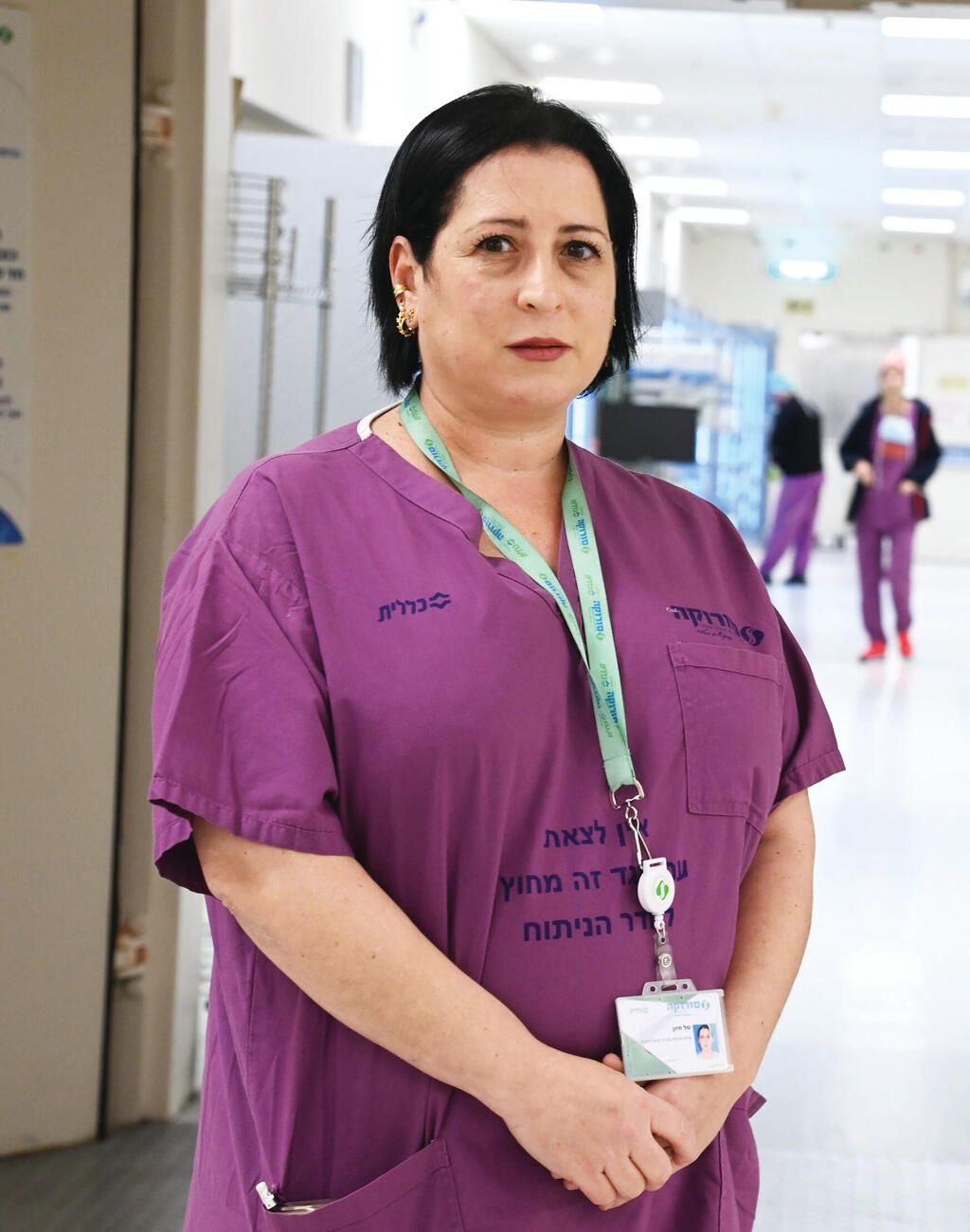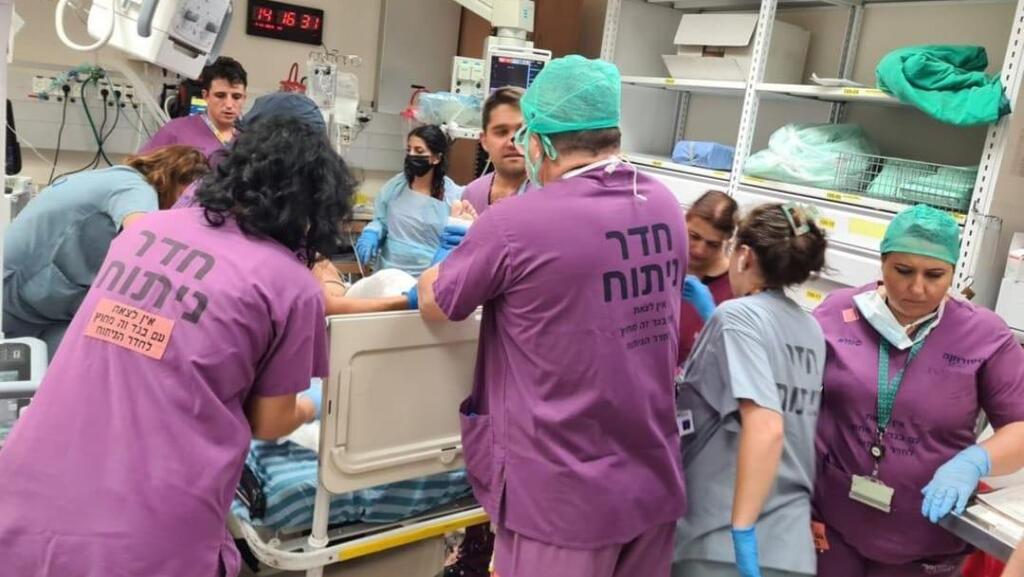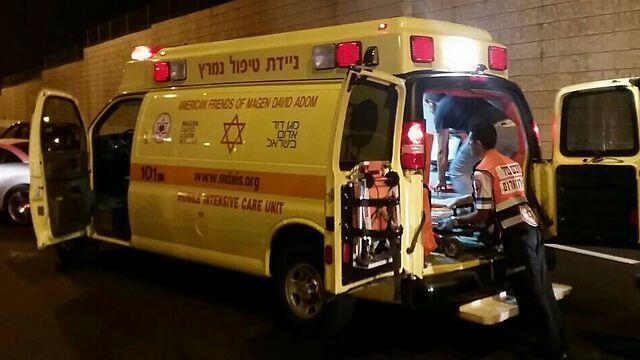"Wheelchairs filled with legs and arms. Dozens of body parts, amputated in an attempt to save young people who arrived from the conflict zone, are placed in medical equipment trolleys." This is the haunting image described by nurse Tal Hayun, head nurse at Soroka Medical Center in Be'er Sheva.
Read more:
Even after three months since that dreadful Saturday, the sight of lifeless and motionless body parts continues to haunt her. "We are accustomed to amputating limbs for medical reasons, such as due to diabetes or infection," she explains.
"But on October 7, within a few hours, we were faced with an unbelievable number of organs that had to be amputated in the operating rooms. These organs had arrived almost completely severed or were injured when the wounded individuals lay in the field for hours with blocked arteries. The medical trolleys, which are typically used for transporting equipment, quickly became filled with hands and legs."
Other carts were swiftly filled with the belongings of the deceased and the injured as they arrived at the hospital. Nurse Hayun vividly recalls, "Pants and shirts, watches, phones and CDs. The amounts collected that day seemed endless. I designated a staff member to gather the valuables from all the rooms, and we handed them over to the security department. To my relief, a significant portion of the items were returned to their rightful owners."
Hayun, a 46-year-old resident of Be'er Sheva, is a mother of three and married to a police officer. As someone accustomed to witnessing challenging situations, she has encountered many difficult scenes throughout her career. However, the memories of that relentless shift on that particular Saturday have stayed with her. She recounts, "That morning, the screen was filled with alarming orange messages. Shortly, we started receiving notifications about the wounded in the operating room. It became clear that it was time for me to report to work. I ensured the safety of my children by leaving them in the safe room, cautioning them not to open the door to anyone, and then I hurried off."
As floodgates open
According to Hayun, that morning the entire nation gathered around their television sets, while Soroka Medical Center operated as a secluded bubble. She explains, "We were isolated from the outside world, in a place with no windows, unaware of the time passing or what was happening beyond our walls. The doctors and nurses in the operating rooms maintained sterility and couldn't touch their phones or communicate with their families. Even if someone called, they went unanswered."
"Suddenly, hundreds of wounded individuals arrived, including both uniformed soldiers and civilians. The civilians, some of whom wearing vibrant shirts and high heels, seemed out of place alongside the soldiers. We tried to gather fragments of information from the arrivals, but it took a while before we could piece everything together and understand the full picture."
For two days, the operating rooms at Soroka Medical Center operated non-stop. Hayun describes the intensity, saying, "As soon as one surgery was completed, another patient would immediately enter the operating room. It was a continuous cycle, one after the other, without a moment's rest. Those patients who didn't require immediate surgery were transferred to other hospitals, while those in critical condition underwent life-saving procedures right here.
"The team was determined to stay and continue working. Everyone worked together and no one wanted to leave. As the night approached, around 11 or 12 o'clock, the influx of the wounded to the emergency room subsided, but the operating rooms continued to function. Surgeries, CT scans, more surgeries and more surgeries. As evening fell, we began to economize our resources, allowing some staff members to go home and rest, as we realized that the situation would not be resolved soon.
"I have many gaps in my memory from that day, complete blackouts. People tell me the things I did and I can't remember. It's like I turned into a void, because everything was so chaotic and traumatic. We received the most severely injured patients, unrecognizable and unidentified, covered in soot, sedated and connected to ventilators. Some of them were partially conscious and able to communicate with us.
"Among all of them, there is one soldier that stands out in my memory, a blond soldier. Even to this day, I have no idea who he is. On his stretcher, there was a phone that incessantly rang. The screen read 'Mom'. It was at that moment that I paused to contemplate what to do. Should I answer the call? What if I accidentally provided the mother with incorrect information about her son? How do you console a mother desperately seeking her child? I was afraid to answer and potentially give her the wrong answer."
What did you do?
"I didn't answer. I didn't have the courage."
The families of the wounded closely followed their loved ones, filled with anxiety and overwhelming uncertainty, desperate to learn about their well-being. Hayun recalls, "They would tell me, 'He has an earring like this,' or 'She has shoes like that,' as they attempted to identify and locate their family members. Some even tried to enter the hospital to be by their side. Later in the evening, when I opened WhatsApp, I was overwhelmed to find a flood of messages, numbering in the millions. I glimpsed at it briefly, only to quickly close it again. I felt incapable of responding at that moment."
'For me, October 7 is an ongoing reality'
At 08:30pm, Hayun received an unexpected reminder from the outside world. It was her eldest daughter informing her that she had been called up to the reserve. This was the first time Hayun's thoughts shifted toward her own home.
She shares, "A profound sense of uncertainty engulfed both of us. Suddenly, my worries extended beyond my patients. By one in the morning, I reached a point where I felt physically exhausted, unable to remain on my feet any longer. I decided to take a few hours' rest at home, and in the morning, I returned to Soroka."
Since then, work at Soroka has continued without respite. The wounded from Gaza continue to arrive, keeping the medical staff constantly occupied. Hayun shares, "For me, October 7 is an ongoing reality. Every day, more helicopters touch down and more wounded are brought in. Occasionally, there are moments when even the strongest nurses cannot hold back their tears and break down. Thankfully, we have a strong support system in place, and we communicate with one another to prevent things from spiraling out of control. The hospital's resiliency unit provides private consultations and workshops for the staff, equipping us with tools for emotional fortitude.
"We receive assistance from every direction. Those who are struggling are given the opportunity to go home for a day or two to rest and rejuvenate. We are provided with the utmost support possible," shares Hayun.
"I am incredibly proud of our nursing team, who often work tirelessly behind the scenes. They dedicate themselves wholeheartedly to their work. In this war, there are soldiers on the ground, and we are like the medical Iron Dome, providing crucial care. However, my hope is that one day we can return to focusing on healing the sick, rather than treating the wounded. We currently mend physical body parts, but I also aspire to heal the soul."





